November 8, 2024
Designer Diary #1: Revenant
Before we delve into how Revenant took shape, I wanted to answer a question that’s been popping up a few times here on BGG: “Who is this Allan Kirkeby anyway?”. That question is totally fair because I’ve only had one other board game published (“Itchy Monkey”), and that is a very different game from Revenant. I also had some great conversations with guests at the SPIEL conference in Essen, who came to play the Revenant demo, and who were curious about my background in games. So here goes…
Early Game Design Days
I’ve always played and designed games. I remember making my first board game around the age of 12. It was a compilation of minigames of all the Olympic disciplines. It was also around that time, when my uncle introduced me to the ZX Spectrum home computer, and he taught me how to design and make my first computer games.
Fast forward to the mid-90s, I was composing electronic music and even signed a record contract, briefly thinking I’d pursue a career in music. A bit of a sidetrack but oddly enough, this detour led me to a contract with a video game studio, where I eventually transitioned from music to game design, level design, graphics, and concept development. Over the years, I rose through the ranks to become a creative lead and executive producer, releasing over 40 games across platforms like PC, Playstation 2, and Gameboy Advance and a lot of other devices that most people today have forgotten or never heard of (“PalmOS” anyone?).
Around 2007 I joined what was then a small startup called Unity. At the time a few guys in a basement, today one of the leading game engines and a multinational corporation. I was part of building up the company and was the CEO at Unity Studios until 2017. But board games always had my heart. From running D&D campaigns for 20 years to playing Settlers, Carcassonne, MtG, and later W40K (I still have my old painted army), Blood Bowl, and the explosion of modern board games, I was constantly designing on the side.
In 2010, I designed a dungeon crawler for my sons, which sparked a renewed interest in board game creation. By 2017, I had a eurogame nominated for an award at Denmark’s Fastaval (a major roleplaying and board gaming convention), and from then on, I was designing 2-3 games each year. However, landing publishing contracts proved difficult—especially for heavier games like Revenant. I eventually landed a contract for Itchy Monkey, but Revenant was always my dream project, despite the challenges it posed.
The Idea for “Space Caravan”– and the Struggles with COVID
Revenant started as a simple note I jotted down on December 11, 2019: “Space journey board game: player board, cards for engine building, captain, ship, and crew.” I didn’t know exactly what the game would become at the time, or that it would eventually feature a full fleet of ships and have a point system with multiple tracks. All I knew was that I wanted to make a game that would be fun for the audience at the Fastaval board game design competition. I talk about Fastaval here because it is and has been an important conference for me and my game designs, and it was my initial goal for showcasing the game, and thus a primary motivator for me to design and develop Revenant (which at the time was called “Space Caravan”).
Then COVID hit Denmark. I remember I was attending another large board game conference with a different game on March 8th 2020, and 3 days later the authorities closed down the country. The lockdowns halted our in-person design meetups, and the Danish board game community (just like the rest of the world) shifted entirely online. We began using tools like Tabletop Simulator to test prototypes and iterate ideas remotely.
In August 2020, I pitched Space Caravan to Fastaval. The concept had evolved, but it was still not in the format of a fully playable prototype. However, – as you can see from the below concept graphics that I sent to Fastaval as part of the pitch, it was already established to have most of the elements you can see in Revenant today.
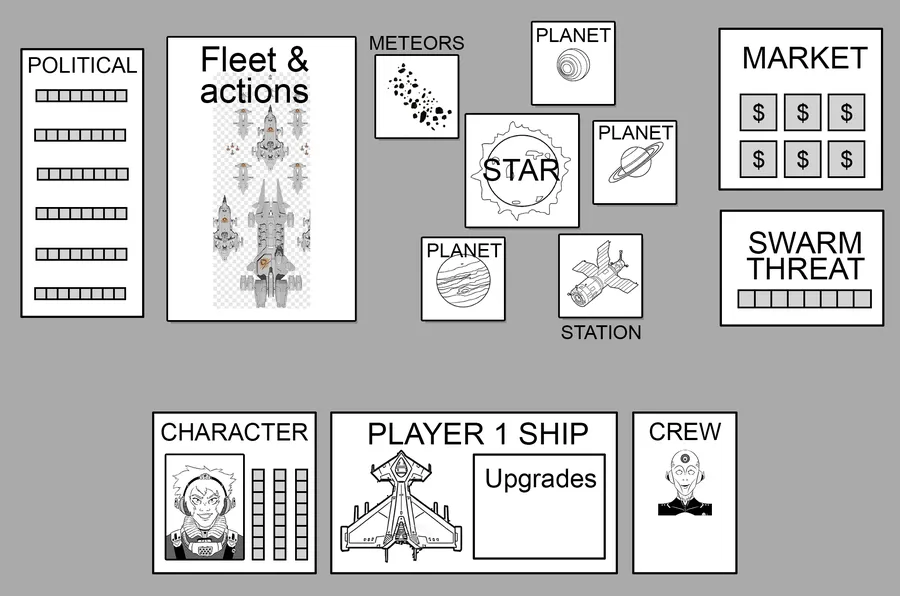
Here is also an excerpt from that first concept pitch to Fastaval in 2020, describing the intended experience:
“The design goal is to build a game where the player choices can impact the story, while at the same time keeping a solid board game system […].
Players will be forced to collaborate. The caravan of ships will gradually diminish over the rounds of the game, as more ships get destroyed by enemies. Not only does this threaten to deal a collaborative loss to the players but will result in action spaces being permanently removed from the game, and thus changing the strategies available to players.
The game will put pressure on players, forcing them to make choices between pushing their own win strategy or choosing to work to save the fleet.
Players will fight for control of the factions, as this is ultimately the way to win.”
However, by the time the conference arrived in March 2021, it was forced to go entirely digital. We had to get creative, using Tabletop Simulator to run gameplay sessions and present new designs. It was chaotic, but somehow it worked—and Space Caravan finally made its debut. The feedback was encouraging, but the game still needed fine-tuning.
Signing with Mindclash
For any game designer, pitching to publishers is a nerve-wracking process. You need a strong design, but you also need timing and luck. I’ve been visiting Essen Spiel for several years to pitch my designs, hoping to find the right publisher at the right time.
In 2022, my luck changed when I met with Mindclash Games, who were fresh off the successful Kickstarter campaign for Voidfall. They saw potential in Space Caravan and felt it could synergize with the Voidfall universe. They took home a prototype, and a few months later I got the message that they loved the game and would like to publish this as a standalone game set in the Voidfall universe.
We signed the publishing agreement in early 2023, and then the work to reimagine the game into the VF universe started. Around April 2023 Robin Hegedűs joined on the development side. Robin’s work on the game has been invaluable, and he has leveraged a lot of his own game design experience to help develop the game.
During development, the project had the working title “Jump”. In the early stages, there was a bit more experimentation with changing mechanics and themes. Eventually, the game settled into the form we have today, and by March 2024 the name Revenant was decided.
Fun fact: there was even a short-lived idea where an Anachrony-themed variant was considered.
From Space Caravan to Revenant
Once I teamed up with Mindclash, we began reimagining the game to fit into the rich lore of the Voidfall universe. Some elements were cut, while others were added to strengthen the connection.
Arriving at SPIEL 2024 in Essen and seeing the first demo prototypes with full artwork and new UI by Ian O’Toole, the 3D printed ships and 3 full tables set up for demoing Revenant was truly epic. It was even better to see so many players enjoying the demos, and then talking to me about their experiences afterwards. Thank you to everyone who came to play.
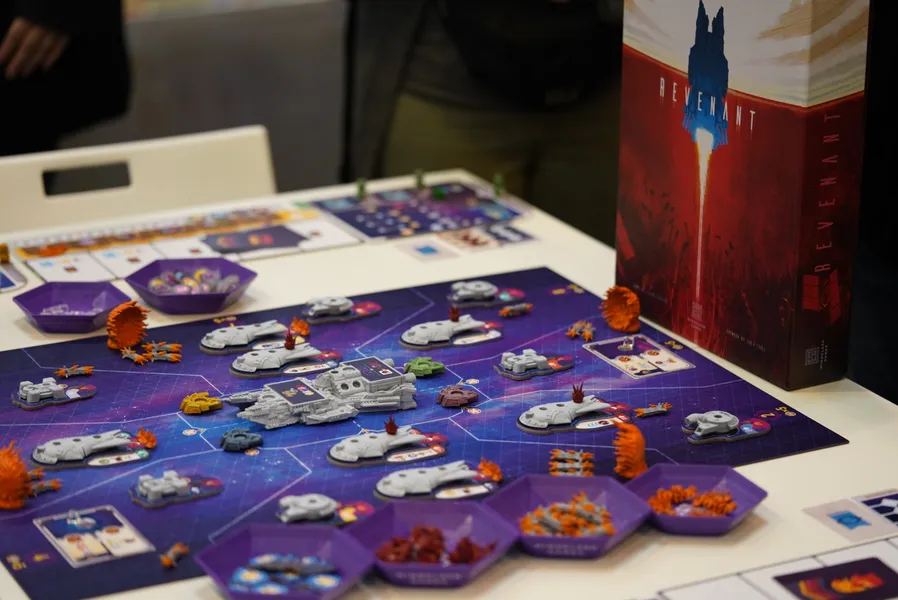
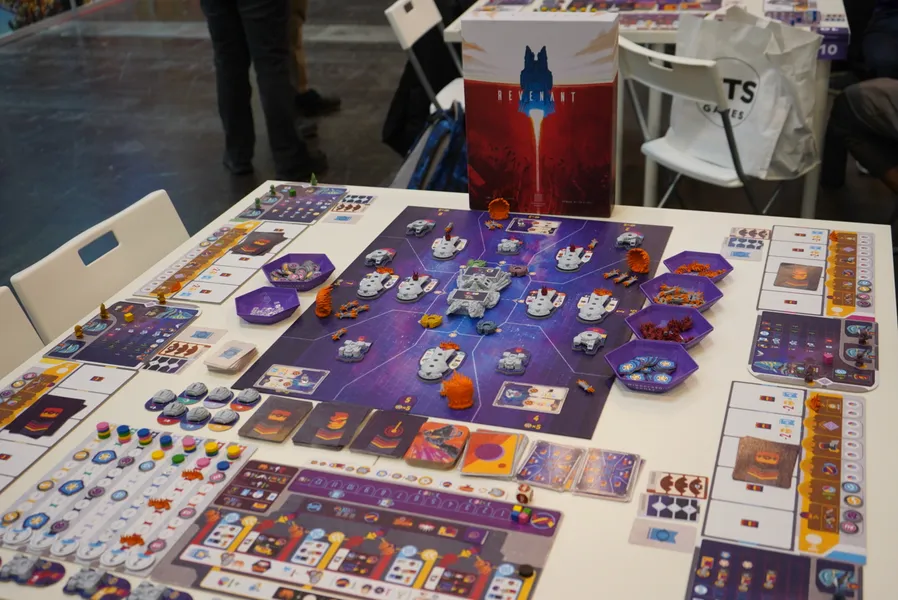
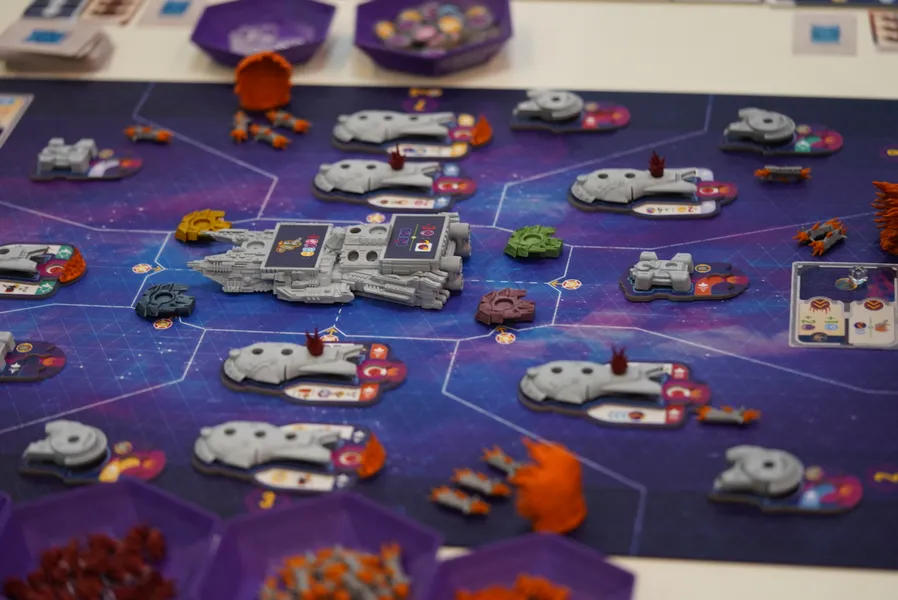
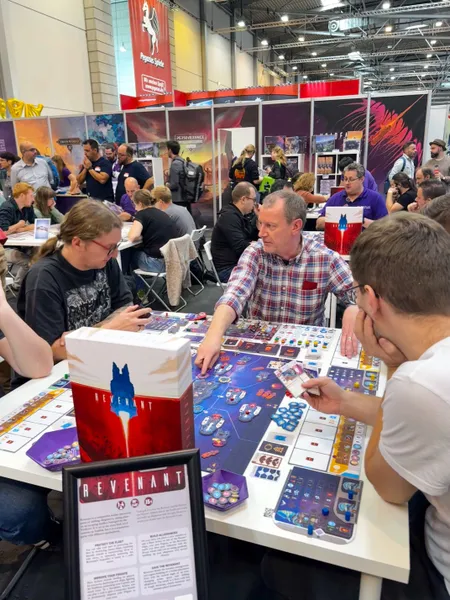
Stay tuned for the next diary entry, where I’ll dive into the core elements of Revenant and explore what makes this game so unique in the Voidfall universe. And in the meantime, please consider following the project on Kickstarter!